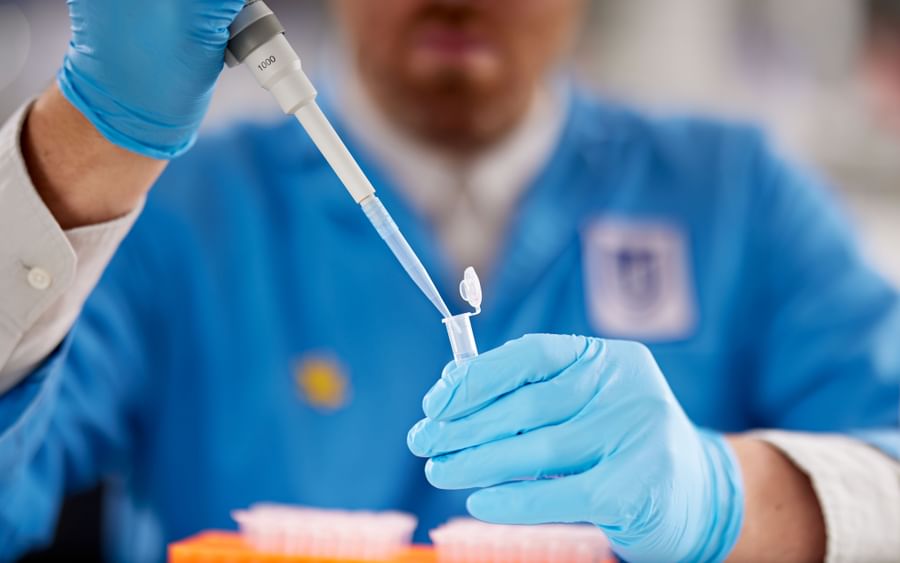Cancer Council SA is committed to funding world-class research that is working to reduce the rate and impact of cancer.
Cancer Council SA’s Research Fellowship Program is a South Australian initiative which invests in the state’s best and brightest early and mid-career researchers to support and advance research that is working towards the next cancer breakthrough.
Our fellowship program also aims to raise the profile of cancer research in South Australia to help our talented local researchers attract more national and international research grants and build a stronger cancer research workforce and broader research infrastructure in our state.
Applications for the 2026 round are currently closed. Please check back here next year to find out when the next round of Cancer Council SA Research Fellowships open.
Meet our 2026 Cancer Council SA Research fellowship recipients

Dr Oluwaseyifunmi Andi Agbejule
Understanding cancer-related financial discrimination in Australia
Dr Oluwaseyifunmi Andi Agbejule from Flinders University has been awarded the 2026 Early-Career Fellowship (Public Health/Health Services) for her research which is examining financial discrimination against people impacted by cancer in Australia.
People impacted by cancer have reported experiencing unfair treatment such as higher insurance costs, loss of employment or being denied financial support. These have the potential to cause long-term financial and emotional harm.
Through her project, Dr Agbejule aims to conduct a national study to understand how widespread financial discrimination is against people impacted by cancer and how it impacts a person’s wellbeing. Dr Agbejule will then use the findings to guide policy changes and legal reforms to better protect people impacted by cancer in Australia.
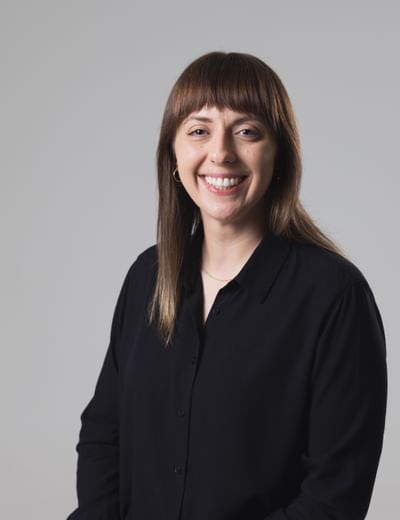
Dr Nicole Dmochowska
Creating a brighter dye to support pancreatic cancer surgery
Dr Nicole Dmochowska from Adelaide University has been awarded the 2026 Early-Career Fellowship (Clinical Medicine/Science Research) for her work which aims to develop a new, brighter dye to assist surgeons in removing pancreatic cancer.
Pancreatic cancer is often difficult to diagnose, with symptoms usually occurring after the cancer has advanced and spread. Completely removing the cancer with surgery offers the highest chance of recovery. Surgeons rely on fluorescent dyes to identify cancer cells, but current dyes fade quickly and do not clearly define the edge of a tumour.
Dr Dmochowska’s research seeks to develop a new, brighter and longer-lasting fluorescent dye called ICGlow. She also aims to develop a targeted version, called FAPi-ICGlow, designed to attach to a marker found mainly around pancreatic tumours. Through these dyes, Dr Dmochowska hopes surgeons will be able to see pancreatic cancers more clearly, leading to improved surgical removal and patient outcomes.
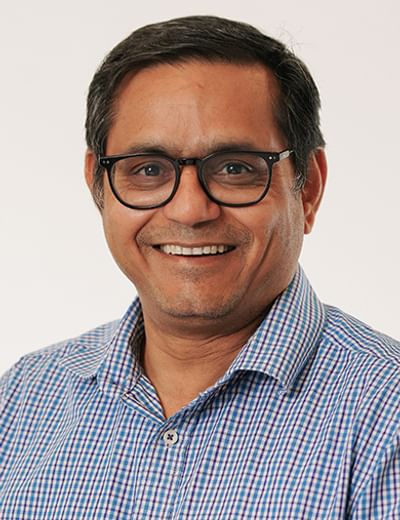
Dr Devendra Hiwase
Preventing blood cancer after treatment
Dr Devendra Hiwase from the South Australian Health and Medical Research Institute (SAHMRI) has been awarded the 2026 Mid-Career Fellowship (Clinical Medicine/Science) to better prevent life-threatening blood cancer developing in cancer survivors following chemotherapy.
In most cases, therapy-related myeloid neoplasm (t-MN) develops as a secondary cancer in people who have previously been treated using chemotherapy or radiation therapy. It is an aggressive form of blood cancer which is hard to treat and is, currently, not well understood.
Dr Hiwase’s research has found t-MN can develop through a range of factors beyond chemotherapy alone, including genetic factors and changes to DNA as a result of treatment. Through this project, Dr Hiwase hopes to map risk factors which could contribute to t-MN, improve pathways for early detection and, through better understanding of the disease, develop ways to prevent it.
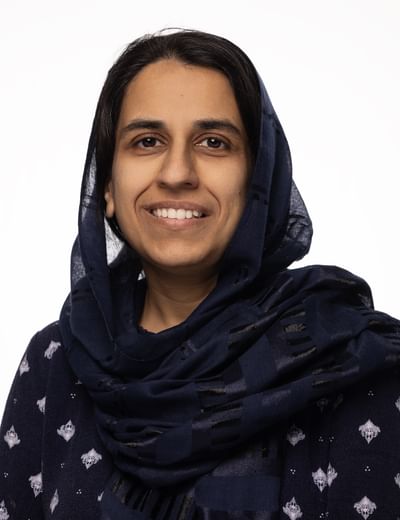
Dr Sana Ishaque
Improving cancer screening rates in diverse communities
Dr Sana Ishaque from Flinders University has been awarded the 2026 Mid-Career Fellowship (Public Health/Health Services) to study factors which impact cancer screening participation rates in diverse communities.
Working with Arabic-, Chinese- and Vietnamese-speaking communities, Dr Ishaque is studying what helps or hinders people of culturally and linguistically diverse backgrounds from participating in bowel and lung cancer screening programs.
The project aims to co-design culturally appropriate resources to help improve participation rates among these communities. It then seeks to test if the new resources increase awareness of screening programs, change attitudes towards them and boost screening behaviours.
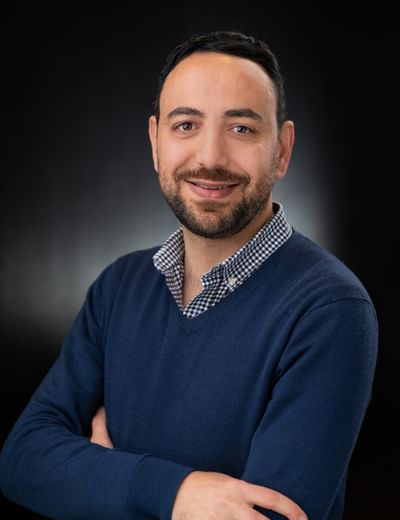
Dr Zeyad D Nassar
Matching genetic profiles to treatment options in prostate cancer
Dr Zeyad Nassar from Adelaide University has been awarded the 2026 Mid-Career Fellowship (Basic Science) for his research examining how to tailor individual treatments for people with prostate cancer.
Prostate cancer is the most common cancer in Australian men, but most patients still get similar treatments even though their cancers can be very different genetically. Instead of using a one-size-fits-all approach, this research looks for ways to match treatments to the specific genetic makeup of each person’s cancer.
Dr Nassar’s project focuses on finding cancer’s Achilles heel using a strategy known as 'synthetic lethality'. Cancer cells can often survive with one genetic fault, but if a second, linked weakness is targeted, the cell dies. Because many prostate cancers already have one faulty gene, blocking its partner gene can kill the cancer cell while leaving healthy cells largely unharmed.
By identifying these hidden weaknesses and linking them to existing or potential treatments, Dr Nassar aims to develop more effective and more personalised treatments for men with prostate cancer.
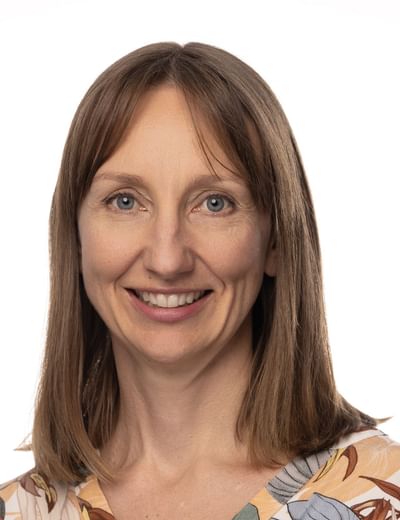
Dr Jacqueline Roseleur
Reducing health gaps and improving outcomes
Dr Jacqueline Roseleur from Flinders University has been awarded the 2026 Early-Career Fellowship (Public Health/Health Services) for her research examining cancer outcomes for people living in disadvantaged areas who have also been diagnosed with a chronic health condition like diabetes or heart disease.
The project aims to study how well chronic conditions are managed across different communities alongside cancer care and treatment. This includes identifying potential barriers to good care and assessing how cost-effective it might be to improve existing services in disadvantaged areas.
Through her research, Dr Roseleur aims to work with health services to develop practical solutions to care barriers and to improve health outcomes for people diagnosed with cancer.
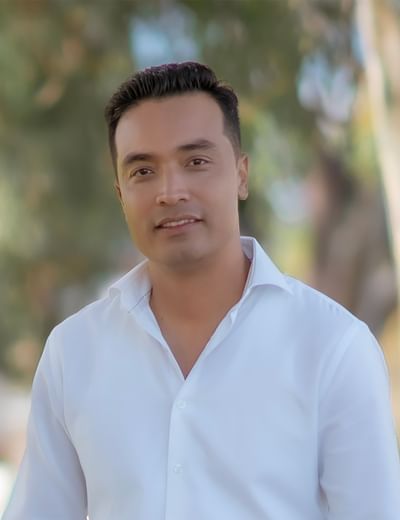
Dr Raj Kumar Shrestha
Developing a new treatment for prostate cancer
Dr Raj Shrestha from Flinders University has been awarded the 2026 Early-Career Fellowship (Basic Science) to support his research into new treatment options for advanced prostate cancer.
Hormonal therapies have been in use to treat prostate cancer for 80 years and, while initially effective in most patients, all prostate cancer eventually becomes resistant to them, leading to lethal disease.
Dr Shrestha’s research focuses on blocking two enzymes—PDIA1 and PDIA5—which prostate cancer cells need to grow. His research is investigating if blocking these two enzymes can cause the prostate cells to die while also activating the body’s natural immune response against the disease. This approach has never been tested in prostate cancer and could lead to a promising new treatment option for people with advanced prostate cancer.
Meet our 2025 research fellowship recipients
Dr Jacqueline Noll - Investigating a new approach to prevent progression of multiple myeloma
Dr Jacqueline Noll from The University of Adelaide and SAHMRI, is a 2025 recipient of our Mid-Career Fellowship (Basic Science) for her work which hopes to find new tests and treatments for the incurable blood cancer, multiple myeloma.
Dr Noll completed her PhD in 2011 through her research into the p53 family of proteins and tumour suppressor genes. Her research is driven by her passion for understanding the complex nature of cancer biology, and Dr Noll ultimately aims to translate that knowledge into improving clinical outcomes for people diagnosed with cancer. Since attaining her PhD, Dr Noll has worked as a post-doctoral researcher at the Myeloma Research Laboratory with a focus on the interactions between tumour cells and the bone marrow microenvironment.
Dr Noll’s Cancer Council SA funded research explores multiple myeloma—an incurable blood cancer — and its relationship to an asymptomatic condition known as monoclonal gammopathy of undetermined significance (MGUS). MGUS is an early, symptom-free condition that sometimes progresses to multiple myeloma. While most people with MGUS never develop cancer, around 10 per cent do go onto develop into multiple myeloma, and there is no current method to identify which people are most likely to progress.
Dr Noll’s research team has identified an enzyme which is essential for myeloma tumour development in preclinical models of the disease. Through investigating the function of this enzyme in tumour development, Dr Noll aims to identify and test a new way to stop or prevent MGUS from transitioning to myeloma, and to develop a blood test which can identify which people diagnosed with MGUS are most likely to develop multiple myeloma.
Dr Chloe Thompson-Peach - Investigating new and effective treatments for a rare blood cancer
Dr Chloe Thompson-Peach from The University of Adelaide and SAHMRI, is a 2025 recipient of our Early-Career Fellowship (Clinical Medicine/Science Research) and with this funding hopes to develop new treatments for a rare blood cancer called myelofibrosis. In particular, a specific mutation of myelofibrosis called CALR, which currently has no effective treatments.
Dr Thompson-Peach was awarded a PhD in 2020 following her research into the identification of breast cancer susceptibility mutations in people who tested negative to having BRCA1 and BRCA2 gene mutations. The research addressed gaps in understanding the genetic predisposition to breast and ovarian cancer and identified new mutations in individuals which were previously undiagnosed. Dr Thompson-Peach’s research has since focussed on advancing precision medicine approaches for blood cancers at the South Australian Health and Medical Research Institute (SAHMRI), while also working as an academic at Flinders University to mentor future scientists.
Currently, Dr Thompson-Peach is researching new treatments for CALR-driven myelofibrosis—a rare blood cancer with limited effective treatment options. Her Cancer Council SA funded research aims to better understand why certain CALR mutations result in more severe symptoms and to create therapies which specifically target mutated cells while preserving the healthy ones. By tailoring treatments to different CALR mutations, Dr Thompson-Peach hopes to improve care and enhance outcomes for people with myelofibrosis.
Dr Tenaw Tiruye - Uncovering the mental health toll of prostate cancer
Dr Tenaw Tiruye from the University of South Australia, is a 2025 recipient of our Early-Career Fellowship (Public Health/Health Services) for his research which explores the gap between the high survival rates of people diagnosed with prostate cancer and the significant impact of treatment on a patient’s quality of life.
Dr Tiruye completed a PhD in gender and health at the University of Newcastle in 2021. Prior to this, he was a lecturer and researcher at Debre Markos University in Ethiopia, where he also led the Public Health Department. Since obtaining his PhD, Dr Tiruye has focused on prostate cancer-related research as part of the University of South Australia’s Cancer Epidemiology and Population Health Research Group.
Through his Cancer Council SA funded research, Dr Tiruye wants to examine the drivers of psychological distress in individuals with prostate cancer to identify more effective strategies for improving their mental wellbeing. Dr Tiruye aims to use these results to inform a co-design workshop aimed at developing evidence-based practice and policy recommendations for improving mental health services for people with prostate cancer, ultimately leading to improved treatment outcomes.
Dr Carly Whyte - Boosting immune responses in head and neck cancer
Dr Carly Whyte from the University of South Australia, is a 2025 recipient of our Early-Career Fellowship (Basic Science) and her research aims to understand how the body’s immune system can potentially lead to new and better treatments for head and neck cancers.
Dr Whyte was awarded a PhD in immunology from the University of Adelaide in 2018. She was then appointed a postdoctoral scientist at the Babraham Institute in Cambridge, where she worked to understand how immune cells are regulated through a cytokine—a small protein in cell signalling—called IL-2. After discovering new mechanisms of action for this protein and identifying new regulatory networks, which explained some of the common side-effects of IL-2’s therapeutic use, Dr Whyte returned to Adelaide and joined the Centre for Cancer Biology at University of South Australia.
Dr Whyte’s current Cancer Council SA funded research focuses on head and neck cancers, one of the most common cancers in Australia. Current treatment options are often ineffective and heavily impact a person’s ability to eat, speak and breathe. Dr Whyte aims to discover ways to enhance the ability of immune cells to target and destroy cancers of the head and neck. In particular, she wants to better understand the role of immune cells called eosinophils, which are more common in head and neck tumours than in healthy tissue. Through this research into eosinophils, Dr Whyte hopes to boost the body’s natural immune response to cancer and improve health outcomes.
Dr Jean Winter - Developing a new blood test for pancreatic cancer
Dr Jean Winter from Flinders University, is a 2025 recipient of our Mid-Career Fellowship (Clinical Medicine/Science Research) with her research that is developing a simple blood test to detect pancreatic cancer in its early stages.
Dr Winter completed a PhD in colorectal cancer at Flinders University in 2015 and was then awarded an international postdoctoral fellowship at The National Institutes of Health in the United States. There she identified genetic biomarkers associated with increased risk of aggressive prostate cancer, before she returned to Australia to now lead the Biomarker Discovery and Application program within the Flinders University Bowel Health Service.
Most pancreatic cancers are diagnosed when symptoms have developed and the cancer has already spread, which means treatment options become limited. Dr Winter’s Cancer Council SA funded project aims to find a way to identify the unique genetic signature of pancreatic cancer through examining blood samples of people with and without pancreatic cancer. By diagnosing pancreatic cancer early, before symptoms develop, Dr Winter hopes to reduce late-stage diagnoses, leading to improved treatment and survival outcomes.
Fellowship opportunities in 2026
Cancer Council SA’s Research Fellowship Program replaces the Cancer Council SA Beat Cancer Project, with all administration of the new fellowship program undertaken by Cancer Council SA.
As part of the fellowship program, Cancer Council SA will award Early-Career Research and Mid-Career Research Fellowships across the following areas of research:
- Basic science research
- Clinical medicine and science research (including translation research)
- Health service/public health research
Fellowship funding schemes
Scheme |
Amount per year |
Duration |
Key requirements |
Matched funding |
|---|---|---|---|---|
|
Early-Career Researcher Fellowship |
$80,000 |
3 years |
<5 years post PhD* |
Required |
|
Mid-Career Researcher Fellowship |
$100,000 |
3 years |
5-10 years post PhD* |
Required |
*Career disruptions and years post PhD relative to research opportunity will be considered.
2026 Metastatic Bowel Cancer Mid-Career Research Fellowship
Cancer Council SA will award a special Mid-Career Fellowship for research into metastatic bowel cancer in 2026. This exclusive fellowship will provide a three-year financial package up to $100,000 per annum ($300,000 total) and will also offer an additional $30,000 per annum ($90,000 total) over the three-year grant period.
How to apply for a Cancer Council SA Research Fellowship
Cancer Council SA’s Research Fellowship Program application process will be in two stages:
Stage 1: Complete an expression of interest application – This application includes a description of the proposal, the intended outcomes and how the findings might lead to a significant advance in cancer knowledge. Applicants will need to provide evidence of PhD award and a curriculum vitae. Certification from the research administration office will be required.
Stage 2: Complete a full application – If shortlisted, applicants will be invited to complete a full application. The full application includes a detailed proposal and certifications by the Head of Department, mentor(s) and research administration office.
Successful applicants will be required to enter into a funding agreement with Cancer Council SA which includes reporting and publicity requirements, and also a number of requirements in relation to the acknowledgment of the funding source.
Applications for the 2026 round are currently closed. Please check back here next year to find out when the next round of Cancer Council SA Research Fellowships open.
Get in touch
For more information about Cancer Council SA’s Research Fellowship Program, get in touch with Cancer Council SA at grants@cancersa.org.au.
